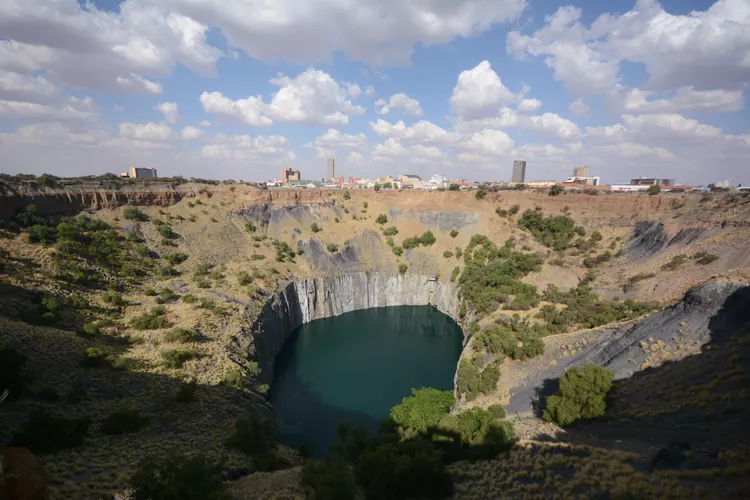Summary
- Introduction to Kimberley: Discover the historical significance of Kimberley, South Africa’s premier diamond mining town.
- The Big Hole: Learn about the world’s largest hand-dug excavation and its fascinating history.
- Diamond Mining Experience: Explore key attractions, including mining machinery and exhibitions dedicated to diamond mining.
- Rich History: Delve into the impact of diamond discovery on the town and its heritage.
Kimberley, South Africa, is home to the world’s largest diamond mine, also known as the “Big Hole.” Dug by humans and so large it is visible from space, the pit has yielded some of the world’s largest diamonds, making the De Beers name famous worldwide.
At Kimberley, visitors can view a 17-minute movie about the location and the history of diamond mining in Africa. Moreover, they have the opportunity to walk out on a high platform to view The Big Hole, take a ride down a faux mining shaft, enter a locked vault to see genuine diamonds of all colors, and visit a small museum.
Visitors will also find a café, gift and jewelry shops, along with many structures and artifacts left from when Kimberley was a thriving mining town. Consequently, they can stroll through the eerily empty streets of the company town and step into the modest home where the De Beers family lived.
Those who arrive at Kimberley’s Victorian railway station by train usually travel to The Big Hole via motorcoach, which is about a ten-minute drive.
Mine Statistics
:max_bytes(150000):strip_icc():format(webp)/DSC_0481-f909a50794bb449eb4a219bc60fd123c.jpg)
Nearly 15 million diamonds were extracted from the Kimberley Diamond Mine, discovered in 1871. Excavation ended in August 1914.
The Big Hole
:max_bytes(150000):strip_icc():format(webp)/DSC_0485-f8a9088e48044d5fa80a5554faf25578.jpg)
That’s deep: The Big Hole is 215 meters, or 705 feet, deep.
Mine Map
:max_bytes(150000):strip_icc():format(webp)/04kim-map-56a4be665f9b58b7d0d8ac12.jpg)
This map helps visitors to understand the facilities they can explore around The Big Hole. They include original and recreated structures from when Kimberley was a working mine, supported by a variety of shops and other necessities.
Diamond Mining Machinery
:max_bytes(150000):strip_icc():format(webp)/DSC_0506-46022e2b82d54b1ba8baf5da5fe5268b.jpg)
The mining machinery, now rusted, was pivotal during the heyday of diamond mining in Kimberley.
Kimberley Diamond Museum
:max_bytes(150000):strip_icc():format(webp)/DSC_0522-3161298b9cdb466e8838c6f472bf5a59.jpg)
The Kimberley Diamond Museum narrates the history of diamond mining and presents fascinating artifacts from the early days of the industry. However, free samples are not available for visitors.
South African Diamond Mining Town
:max_bytes(150000):strip_icc():format(webp)/DSC_0544-dd62028c733f4888a830292ef65890f4.jpg)
The discovery of diamonds attracted not only miners but also tradesmen to Kimberley, fostering the growth of a bustling town at the end of the nineteenth century.
Diamond Miners’ Huts
:max_bytes(150000):strip_icc():format(webp)/11kimtown-huts-56a4be673df78cf77284194b.jpg)
Although slavery was abolished in the Cape Colony in 1834, many miners experienced conditions not much better than those without freedom.
Kimberley’s Oldest House
:max_bytes(150000):strip_icc():format(webp)/09kimtown-oldhouse-56a4be673df78cf772841948.jpg)
This house, prefabricated in England in 1877, was transported to the diamond fields by ox wagon and erected on 14 Pneil Rd. The first registered owner was Mr. A. J. Petersen.
De Beer Gravestone
:max_bytes(150000):strip_icc():format(webp)/10debeer2-56a4be675f9b58b7d0d8ac18.jpg)
Johannes De Beer, an Afrikaner, was the landowner upon whose property diamonds were discovered. He is buried in Kimberley.
Kimberley Diamond Buyer
:max_bytes(150000):strip_icc():format(webp)/13kimtown-diamondbuyer-56a4be683df78cf77284194e.jpg)
This office played a vital role in the diamond trade, serving as a purchasing center for diamonds found in Kimberley before they were sent overseas for cutting and sale.
Kimberley Bank
:max_bytes(150000):strip_icc():format(webp)/12kim-bank-56a4be675f9b58b7d0d8ac1b.jpg)
Little of the wealth extracted from the Kimberley mines benefited the local population; instead, most of the profits were sent abroad.
The Kimberley diamond mine significantly enriched Englishman Cecil Rhodes, founder of De Beers. Consequently, the company grew to dominate the diamond industry. This imperialistic figure, along with his British South Africa Company, established Rhodesia, which encompasses the southern African nations of Zimbabwe and Zambia.




